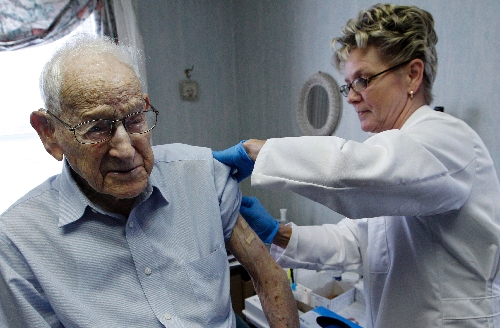Keys to longevity sought from DNA of centenarians

NEW YORK — George Eberhardt turned 107 last month, and scientists would love to know how he and other older folks like him made it that far. So he’s going to hand over some of his DNA.
He’s one of 100 centenarians taking part in a project announced Wednesday that will examine some of the oldest citizens with one of the newest scientific tools: whole-genome sequencing, the deciphering of a person’s complete collection of DNA.
Scientists think DNA from very old healthy people could offer clues to how they lived so long. And that could one day lead to medicines to help the rest of us stay disease-free longer.
By the time you reach, say, 105, "it’s very hard to get there without some genetic advantages," says Dr. Thomas Perls, a geriatrics expert at Boston University.
Perls is helping find centenarians for the Archon Genomics X Prize competition. The X Prize Foundation, best known for a spaceflight competition, is offering $10 million in prize money to researchers who decipher the complete DNA code from 100 people older than 100. The contest will be judged on accuracy, completeness and the speed and cost of sequencing.
The contest is a relaunch of an older competition with a new focus on centenarians, and it’s the second sequencing project involving the elderly to be announced this month.
Genome pioneer J. Craig Venter says the centenarian project is just a first step in revealing the genetic secrets of a long and healthy life.
"We need 10,000 genomes, not 100, to start to understand the link between genetics, disease and wellness," said Venter, who is co-chairing the X Prize contest.
The 107-year-old Eberhardt, of Chester, N.J., played and taught tennis until he was 94. He said he’s participating in the X Prize project because he’s interested in science and technology. It’s not clear his genes will reveal much. Nobody else in his extended family reached 100, and he thinks only a couple reached 90, he said in a telephone interview.
So why does he think he lived so long? He credits 70 years of marriage to his wife, Marie. She in turn cites his "intense interest in so many things" over a lifetime, from building radios as a child to pursuing a career in electronics research.
But scientists believe there’s more to it, and they want to use genome sequencing to investigate. Dr. Richard Cawthon of the University of Utah, who is seeking longevity genes by other means, says it may turn up genetic features that protect against multiple diseases or that slow the process of aging in general.
Protective features of a centenarian’s DNA can even overcome less-than-ideal lifestyles, says Dr. Nir Barzilai of the Albert Einstein College of Medicine in New York. His own study of how centenarians live found that "as a group, they haven’t done the right things."
Many in the group he studied were obese or overweight. Many were smokers, and few exercised or followed a vegetarian diet. His oldest participant, who died this month just short of her 110th birthday, smoked for 95 years.
"She had genes that protected her against the environment," Barzilai said. One of her sisters died at 102, and one of her brothers is 105 and still manages a hedge fund.
Earlier this month, Scripps Health of San Diego announced a different genome project involving the elderly. The Scripps Wellderly Study will receive the complete genomes of 1,000 people age 80 and older from a sequencing company.
A complete genome reveals not only genes but also other DNA that’s responsible for regulating genes. It’s "the full monty," showing DNA elements that are key for illness and health, says Dr. Eric Topol, who heads the Wellderly Study.
Participants in that study have an average age of 87 and range up to 108, and they’ve never had diabetes, heart disease or cancer, or any neurological disease.
"Why are these people Teflon-coated?" Topol asked. "Why don’t they get disease?"
The ability to turn out lots of complete genomes is "the new-new thing" in trying to find out, he said.
"There’s been too much emphasis on disorders per se and not enough on the people who are exceptionally healthy," to learn from their genomes, Topol said. "Now we have the powerful tools to do that."
MORE INFORMATIONX Prize competition
Wellderly Study












